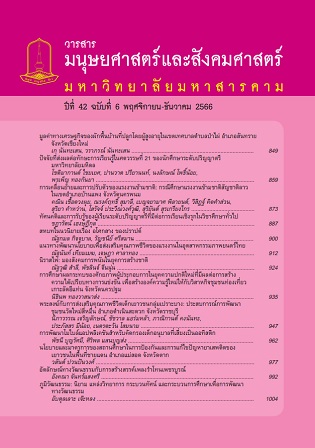ทัศนคติและการรับรู้ของผู้เรียนระดับปริญญาตรีที่มีต่อการเรียนเชิงรุกในวิชาศึกษาทั่วไป
Main Article Content
บทคัดย่อ
การเรียนรู้เชิงรุกเป็นกระบวนการเรียนรู้ที่ให้ความสำ คัญกับบทบาทและการมีส่วนร่วมของผู้เรียนในกิจกรรมการเรียนรู้อย่างตื่นตัว หมวดวิชาศึกษาทั่วไปตามที่กระทรวงศึกษาธิการกำหนดไว้มีเป้าหมายเพื่อเตรียมทักษะผู้เรียนในการเป็นพลเมืองในศตวรรษที่ 21 งานวิจัยนี้จึงได้ศึกษาความคิดเห็นของผู้เรียนที่มีต่อกิจกรรมเรียนรู้รูปแบบต่างๆ เหตุผลของผู้เรียนที่มีต่อกิจกรรมที่ชอบมากที่สุดและการรับรู้ของผู้เรียนต่อกระบวนการจัดการเรียนการสอน ผลการวิจัยพบว่า ผู้เรียนส่วนมากเห็นว่าเกมเคลื่อนไหวร่างกาย เกมตัดสินใจ กิจกรรมระดมสมอง และเรื่องเล่า เป็นกิจกรรมที่สนุก ส่งเสริมการใช้ความคิดและการมีส่วนร่วม นอกจากนั้นยังพบว่า กิจกรรมเรียนรู้ที่หลากหลาย เป็นการเปิดโอกาสให้ผู้เรียนจำ นวนมากในห้องเรียนขนาดใหญ่เช่นวิชาศึกษาทั่วไป และผู้เรียนทุกคนที่มีความชอบ
แตกต่างกันและมาจากหลากหลายสาขาได้มีบทบาทร่วมกัน งานวิจัยนี้สนับสนุนการจัดการเรียนเชิงรุกที่เน้นบทบาทของผู้เรียน ด้วยการใช้กิจกรรมที่สนุก น่าสนใจ และหลากหลายซึ่งจะช่วยให้เข้าถึงผู้เรียนทุกๆ คน เพิ่มแรงจูงใจการเรียน และไม่มีผู้เรียนคนใดที่จะถูกทิ้งอยู่ข้างหลัง
Article Details
เอกสารอ้างอิง
Bonwell, C. C. (1999). Using active learning to enhance lectures. Applied Economic Perspectives and Policy, 21(2), 542 - 550.
Fayombo, G. A. (2012). Active learning: Creating excitement and enhancing learning in a changing environment of the 21st century. Mediterranean Journal of Social Sciences, 3(16), 107.
Garris, R., Ahlers, R., & Driskell, J. E. (2017). Games, motivation, and learning: A research and practice model. In Simulation in Aviation Training (pp. 475 - 501). Routledge.
Gunawan, J. (2016). Understanding culture in higher education in Thailand. Education for Health,29(2), 160.
Hernik, J., & Jaworska, E. (2018). The effect of enjoyment on learning. In Proceedings of INTED2018 Conference (pp. 508 - 514).
Kaczmarczyk, J., Davidson, R., Bryden, D., Haselden, S., & Vivekananda-Schmidt, P. (2016).
Learning decision making through serious games. The Clinical Teacher, 13(4), 277 - 282.
Lumpkin, A., Achen, R. M., & Dodd, R. K. (2015). Student perceptions of active learning.College Student Journal, 49(1), 121 - 133.
Kutty, A.S. & Joy, M.M., (2018). Can learning be fun? https://www.researchgate.net/publication/330185223_CAN_LEARNING_BE_FUN
McLean, L., & Tuite, E. (2016). Stories and their value: Exploring the role of storytelling in social
care practice. Scottish Journal of Residential Child Care, 15(2), 29 - 45.
Negrea, S. (2018). Reconstructing general Ed. https://universitybusiness.com/reconstructing -general - ed - for - colleges - and - universities/
Pagram, P., & Pagram, J. (2006). Issues in e - learning: A Thai case study. The Electronic Journal of Information Systems in Developing Countries, 26(1), 1-8.
Patton, C. M. (2015). Employing active learning strategies to become the facilitator, not the authoritarian: A literature review. Journal of Instructional Research, 4, 134 - 141.
Prince, M. (2004). Does active learning work? A review of the research. Journal of engineeringeducation, 93(3), 223 - 231.
Ryan, R. M., & Deci, E. L. (2000). Intrinsic and extrinsic motivations: Classic definitions and new directions. Contemporary Educational Psychology, 25(1), 54 - 67.
Ryan, R. M., & Deci, E. L. (2009). Promoting self - determined school engagement: Motivation, learning, and well - being. In K. R. Wenzel & A. Wigfield (Eds.), Handbook of
motivation at school (pp. 171-195). Routledge/Taylor & Francis Group. Shek, D. T., Wu, F. K., & Chai, W. Y. (2017). Students’ views on general education: insights gained from the narratives of Chinese students in Hong Kong. International Journal
on Disability and Human Development, 16(4), 443 - 450.
Tempelaar, D., Rienties, B., Giesbers, B., & van der Loeff, S. S. (2013). How cultural and learning style differences impact students’ learning preferences in blended learning.In Transcultural blended learning and teaching in postsecondary education (pp. 30- 51). IGI Global.
Wijit, C. (2014). The application of active learning to develop creativity in general education. International Journal of Environmental and Ecological Engineering, 8(4), 1015 - 1017.


